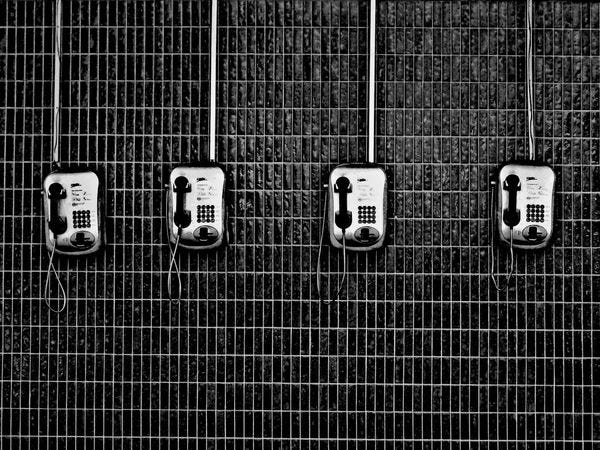Prison Telecom Company Forced To Give Back Half The Money It Stole From Families Of Prisoners
Good news, but better news: The FCC won't let them do it again.
Every year, American families spend more than $1.4 billion calling their relatives in prison. This is indicative both of the incredible number of people we have in prison, as well as the predatory nature of the telecom companies that make it incredibly expensive to call them, frequently more than a dollar a minute (and up to $14 a minute before the FCC capped rates in 2015).
But one of those companies is getting a little karma this week. In the last decade prison telecom giant Global Tel Link (GTL) has seized $121 million from prepaid accounts it had deemed inactive. People would pay a certain amount of money into a prepaid account in order to talk to someone in prison, but if it went unused for a certain amount of time the company would declare it inactive and just take the money. Some people call this "stealing."
Following the resolution of a class action lawsuit alleging that GTL had unjustly enriched itself by converting the money in "inactive" accounts to revenue, the company will be required to pay back $67 million of that money in refunds and credits to plaintiffs who had their accounts deemed inactive after less than 180 days, which is at least something. Obviously it would have been preferable for GTL to have to pay back all the money it stole, but that would involve treating it the way poor people who steal money are treated, and that would just be silly .
Though it is pretty ironic that so many of the people who use the company's services are using them because they stole far less than $121 million.
GTL's actions only actually came to light when it tried to pull this scam on an actual lawyer.
The details about GTL’s actions came to light as part of a class-action lawsuit brought by attorney Benson Githieya in Georgia. According to that suit, Githieya set up an account with GTL’s AdvancePay service and loaded it with funds so his cousin in a South Carolina prison would be able to call him. But after 90 days of inactivity, Githieya said GTL repossessed all the money left in his account. This policy played out across so many customers, that according to court filings, GTL brought in an average of more than $1 million a month from seized accounts over the course of eight years. [...]
While Githieya’s claims have been public since April 2015 when he filed suit, the total sum of the fortune GTL seized was only recently released, spurring prison reform advocates to call the FCC into action. The court documents show that in October 2018 alone, GTL took $1.8 million in revenue simply by seizing customers’ unspent funds. The practice allegedly did not stop even after the suit was filed. Even now, the full extent of GTL's seizures are unknown, as the court has allowed revenue since September 2019 to be redacted.
On the even brighter side, the FCC proposed new rules earlier this month (PDF) that would bar GTL and other prison telecom companies from scamming people in this way.
To address allegations of abusive provider practices, we prohibit providers from seizing or otherwise disposing of funds in inactive calling services accounts until at least 180 calendar days of continuous inactivity has passed in such accounts, after which we require providers to refund the balance or dispose of the funds in accordance with applicable state law. We lower our cap on provider charges for individual calls when neither the incarcerated person nor the person being called has an account with the provider, as well as our cap on provider charges for processing credit card, debit card, and other payments to calling services accounts. Finally, we amend the definitions of “Jail” and “Prison” in our rules to conform the wording of those rules with the Commission’s intent in adopting them in 2015.
These new rules also require these companies "provide access to all relay services eligible for Telecommunications Relay Services (TRS) Fund support," so that prisoners with disabilities can communicate with people on the outside.
For 40 years, studies have consistently shown that the more contact prisoners have with their families and loved ones, the less likely they are to reoffend. Cynically, this means it would actually save us quite a bit money in the long run if we just subsidized those phone calls (because re-incarcerating people obviously costs money). But that would make some people feel icky, so we can't. The best we can do right now is ask that these private prison telecom companies not literally steal money from people with family members in prison. So it is nice that this will be happening.
[ Protocol / new FCC proposed rules ]
Do your Amazon shopping through this link, because reasons .
Wonkette is independent and fully funded by readers like you. Click below to tip us!




But if private companies aren't allowed to steal money from prisoners and their families, then they can't make as much money as they feel they deserve. Socialism at work once again *hyperventilate* *hyperventilate*.
As through this world you travel, as through this world you roamYou won't never see an outlaw drive a family from their home.